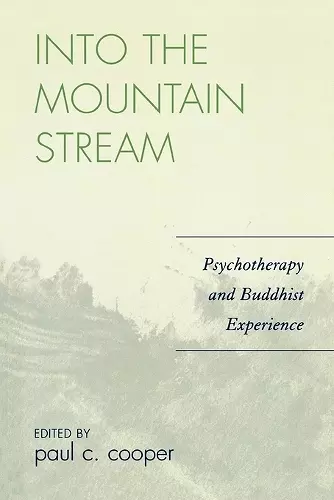Into the Mountain Stream
Psychotherapy and Buddhist Experience
Format:Paperback
Publisher:Jason Aronson Publishers
Published:26th Jan '07
Currently unavailable, and unfortunately no date known when it will be back
This paperback is available in another edition too:
- Hardback£102.00(9780765704641)

Into the Mountain Stream represents a natural development in the conversation between Buddhism and psychoanalysis. This fluid, evolving, multi-textured conversation encompasses theory, philosophy, technique and the personal experiences of those involved as patients, as clinicians and as Buddhist practitioners. This edition, which formalizes and furthers this living conversation between Buddhism and psychoanalysis, in the form and style proposed, is not presently available. Clinical material expands and enriches the present rapidly growing theoretical and technical literature. In this sense, this collection bridges the gap between discourse that has impact and language that is informational. Some of the many questions that we examine include: -How does psychotherapy deepen the practitioner's Buddhist involvements? -How do both practices interact to enrich an individual's life? -What is the efficacy of a Buddhist informed psychotherapy? -What are the global and societal ramifications of the expanded vision that might derive
The 12 essays in this volume all contribute rich material to the problem of how to suffer life as we encounter it, and it is noteworthy that much of the volume is composed of reports of the journeys that the authors have made in learning about their own suffering. The authors do convey the importance of Buddhist practice and make it clear that any convergence is not the result of simply taking an element here and there and tossing it into a psychological treatment plan. Clearly the reader walks away witha sense of the importance of many years of practice to make integration effective. From this collection the reader will appreciate that the basis of human suffering follows from the construction of an individual's life... * PsycCRITIQUES *
Paul C. Cooper has given us a most interesting and accessible anthology concerning the developing conversation between Buddhism and psychoanalysis. In twelve fairly short, thoughtful, and provocative chapters we read clear examples of how Buddhist-inspired psychoanalytic practitioners use their sensibilities and emotional responsiveness to enhance their clinical work and their own personal lives. In summary, this multitextured volume includes some theory, philosophy, technique, and, most of all, descriptions of the personal experiences of the contributors as patients, as clinicians, and as Buddhist practitioners. It is a book well worth reading if you want to expand and enrich your knowledge and experiential sense of what Buddhistinspired psychoanalystsare doing with their patients. Perhaps most importantly, Cooper and his contributors have given us a sense of how some analysts struggle to achieve a modicum of autonomy, inner peace, and goodness, using a Buddhist-inspired psychoanalytic perspective.. * Psychoanalytic Review *
Pushed by an inner imperative to engage both Buddhist and psychoanalytic practices wholeheartedly, the writers of these essays are on fire with their struggle to articulate their lived experience of an as-yet-undelineated frontier of embodied mind where psyche and spirit converge. The result is a splendid feast of stories of people who have sought, with bone-deep courage and unflinching honesty, to honor both their hearts and their intellect in their personal and professional pursuit of truth. They will be called 'pushers of boundaries,' 'troublemakers' and 'keepers of the gateless gates'. -- Robert Jingen Gunn, Ph.D., author of Journeys into Emptiness
The 12 essays in this volume all contribute rich material to the problem of how to suffer life as we encounter it, and it is noteworthy that much of the volume is composed of reports of the journeys that the authors have made in learning about their own suffering.
The authors do convey the importance of Buddhist practice and make it clear that any convergence is not the result of simply taking an element here and there and tossing it into a psychological treatment plan. Clearly the reader walks away with a sense of the importance of many years of practice to make integration effective.
From this collection the reader will appreciate that the basis of human suffering follows from the construction of an individual's life.
Paul C. Cooper has given us a most interesting and accessible anthology concerning the developing conversation between Buddhism and psychoanalysis. In twelve fairly short, thoughtful, and provocative chapters we read clear examples of how Buddhist-inspired psychoanalytic practitioners use their sensibilities and emotional responsiveness to enhance their clinical work and their own personal lives.
In summary, this multitextured volume includes some theory, philosophy, technique, and, most of all, descriptions of the personal experiences of the contributors as patients, as clinicians, and as Buddhist practitioners. It is a book well worth reading if you want to expand and enrich your knowledge and experiential sense of what Buddhistinspired psychoanalysts are doing with their patients. Perhaps most importantly, Cooper and his contributors have given us a sense of how some analysts struggle to achieve a modicum of autonomy, inner peace, and goodness, using a Buddhist-inspired psychoanalytic perspective.
ISBN: 9780765704658
Dimensions: 228mm x 153mm x 17mm
Weight: 340g
192 pages